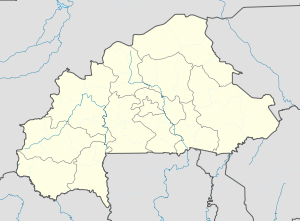Ouagadougou, Burkina Faso
| Ouagadougou | |
|---|---|
| City | |

Place des cinéastes
|
|
| Nickname(s): Ouaga | |
| Location within Burkina Faso | |
| Coordinates: 12°21′26″N 1°32′7″W / 12.35722°N 1.53528°WCoordinates: 12°21′26″N 1°32′7″W / 12.35722°N 1.53528°W | |
| Country |
|
| Region | Centre Region |
| Province | Kadiogo |
| Government | |
| • Mayor | Casimir Marin Ilboudo (since 2013) |
| Area | |
| • City | 219.3 km2 (84.7 sq mi) |
| • Metro | 2,805 km2 (1,083 sq mi) |
| Elevation | 305 m (1,001 ft) |
| Population (2015) | |
| • City | 2,200,000 |
| • Density | 6,727/km2 (17,420/sq mi) |
| • Metro | 2,500,000 |
| Area code(s) | +226 50 |
| Website | www |
Ouagadougou (/ˌwɑːɡəˈduːɡuː/; Mossi: [ˈwaɡᵊdᵊɡᵊ]) is the capital of Burkina Faso and the administrative, communications, cultural and economic centre of the nation. It is also the country's largest city, with a population of 1,475,223 (as of 2006[update]). The city's name is often shortened to Ouaga. The inhabitants are called ouagalais. The spelling of the name Ouagadougou is derived from the French orthography common in former French African colonies.
Ouagadougou's primary industries are food processing and textiles. It is served by an international airport and it is linked by rail to Abidjan in the Ivory Coast. There is no rail service to Kaya. There is a paved highway to Niamey, Niger, south to Ghana, and southwest to Ivory Coast. Ouagadougou was the site of Ouagadougou grand market, one of the largest markets in West Africa, which burned in 2003 and has since been reopened. Other attractions include the National Museum of Burkina Faso, the Moro-Naba Palace (site of the Moro-Naba Ceremony), the National Museum of Music, and several craft markets.
...
Wikipedia

